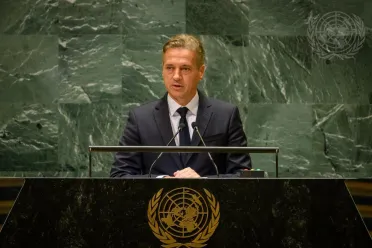Statement
Statement summary
ROBERT GOLOB, Prime Minister of Slovenia, said that in times of wars, climate catastrophes, increasing inequalities and deepening polarization, the adoption of Pact for the Future was “a rare flicker of unity”. Noting the gradual but steady erosion of the power of rules, he criticized the Security Council’s inability to respond effectively to major conflicts, including those in Gaza, Ukraine and Sudan. In Ukraine, he said, “if we are to let this aggression pass, we open doors to many similar wars across the globe.” In Gaza, almost four months since the Council’s resolution on a ceasefire and the hostages, a deal is nowhere close. Concurrently, in the West Bank and East Jerusalem, violence and dehumanization of Palestinians have reached a boiling point. “The region is at the brink of an abyss,” he asserted, adding that de-escalation is urgently needed, starting with the ceasefires in Gaza and Lebanon. He also pointed to the man-made humanitarian catastrophe in Sudan, with millions displaced and in desperate need of humanitarian aid.
“Why has the UN Security Council failed humanity,” he asked, adding that the “permanent five” — misusing the veto and putting national interests first — effectively blocked the organ’s work. “The concerns and pain that we feel for civilians […] should not depend on our geographical or political proximity to the conflict,” he stressed. Noting that “the United Nations are so much more than just the Security Council,” he commended the work of nameless humanitarian workers on the ground, in armed conflicts, among the civilians representing the face of the United Nations. In Gaza, he said, humanitarians are not just occasional collateral victims, they seem to have become a deliberate military target. The sense of impunity for crimes in Gaza is putting humanitarian organizations under stress elsewhere, undermining the essence of the UN and affecting the work of humanitarian organizations and UN agencies.
Turning to climate change, he said its impact is mostly felt on the lifeline for people and nature — water. Extreme weather events are multiplying water-related risks across the world, and people suffering from armed conflicts do not have the luxury of high-tech solutions. Instead, they are denied basic access to clean drinking water, he observed, adding that access to water is becoming weaponized in Yemen, Somalia, Gaza and Sudan. He further underscored that today's world is increasingly hostile to children’s rights: more children than ever are experiencing violence in all settings, many have lost their lives, are forcibly displaced, exposed to most traumatic experiences, imprisoned, denied education and health care and face extreme poverty and social exclusion.
To respond to the extreme suffering of the children in Gaza, Slovenia is offering concrete help with the Foundation “Let them dream”, which deals with their rehabilitation. This project — launched years ago — has already helped hundreds of children from Gaza who came on rehabilitation in Slovenia and will continue to do so. Sadly, some of these kids were the victims of recent aggression on Gaza, he said, sending a clear message to the Prime Minister of Israel, Benjamin Netanyahu — “stop the bloodshed, stop the war, stop the suffering, end the occupation of Palestine.”
Full statement
Read the full statement, in PDF format.
Photo

Previous sessions
Access the statements from previous sessions.
